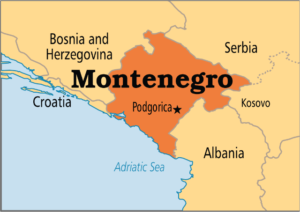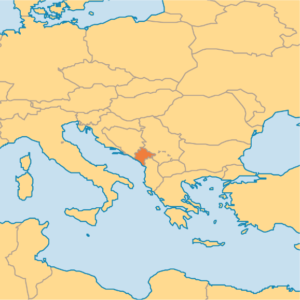SEPTEMBER 5- TODAY’S READING FROM THE ONE YEAR BIBLE- ECCLESIASTES 10:1-12:14; 2 CORINTHIANS 8:1-15; PSALM 49:1-20; PROVERBS 22:20-21
TODAY’S READING FROM THE OLD TESTAMENT- – ECCLESIASTES 10:1-12:14.
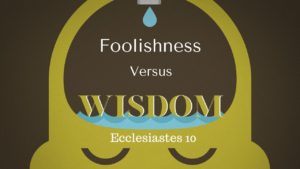 The reporter contrasts the wise and the foolish. Wisdom is the skill of knowing the right thing to do and doing it. Wisdom is learning what God has commanded and then putting these commands into practice. As we learned in the previous chapter, sin sabotages peace, but wisdom can dissolve wars.
The reporter contrasts the wise and the foolish. Wisdom is the skill of knowing the right thing to do and doing it. Wisdom is learning what God has commanded and then putting these commands into practice. As we learned in the previous chapter, sin sabotages peace, but wisdom can dissolve wars.
Ecclesiastes 9:18 18 Wisdom is better than weapons of war, but one sinner destroys much good.
 Ecclesiastes 10:1 1 Dead flies make a perfumer’s oil stink, so a little foolishness is weightier than wisdom and honor.
Ecclesiastes 10:1 1 Dead flies make a perfumer’s oil stink, so a little foolishness is weightier than wisdom and honor.
A dead fly in the ointment ruins its value. One foolish sin can ruin a career. How many examples can be found today of those who had remarkable careers of success only to have their reputations destroyed because of one shameful act of foolishness.
A person can be walking on the right road but going in the wrong direction!
Ecclesiastes 10:3 3 Even when the fool walks along the road, his sense is lacking, and he demonstrates to everyone that he is a fool.
A fool gravitates to the ‘sinister’ (the Latin word for ‘left’; See verse 2)
A wise man or woman who has godly convictions can resist peer pressure, and even the scorn of rulers, in their pursuit of valor. They should remain calm and stand for what is right.
Ecclesiastes 10:4 4 If the ruler’s temper rises against you, do not abandon your position, because composure allays great offenses.
The Qoheleth reports that it is not always the wise who rise to the top. He sees many fools in positions of leadership and people born with many advantages. Yet they end up in lowly positions of servitude, debased and oppressed (10:5-7). Previously we learned that life is not always fair. The race is not always won by the swift (Ecclesiastes 9:11). It is not necessarily the person with the most talent who is most recognized or rewarded.
Life is full of pitfalls and dangers, but we must take necessary risks if we are to accomplish anything (10:8-9).
We must recognize that we need to take time and plan to develop our skills and sharpen our God-given tools. Fools can burn themselves out, working away until they lose their cutting edge. A wise person makes necessary investments in self-maintenance.
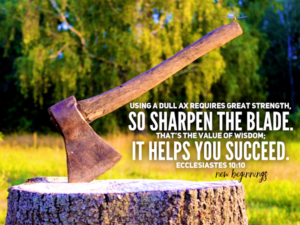 Ecclesiastes 10:10 10 If the axe is dull and he does not sharpen its edge, then he must exert more strength. Wisdom has the advantage of giving success.
Ecclesiastes 10:10 10 If the axe is dull and he does not sharpen its edge, then he must exert more strength. Wisdom has the advantage of giving success.
There is a danger in rushing into business without proper planning, training, and circumspect preparation (10:11).
There are some people who speak without thinking. They love to hear themselves talk. This, the reporter says, is folly (10:13-14).
Many people work hard, but they do not know what they are working for. And they have no meaningful life of their own (10:15). They lack significant relationships and meaningful pursuits outside of their jobs.
Ecclesiastes 10:15 15 The toil of a fool so wearies him that he does not even know how to go to a city.
There are self-indulgent fools who prioritize feasting over working. They lavishly exhaust their food supply while neglecting their production capacity. Better to feast at the right time and for the right purposes- for strength, rather than self-indulgent pleasures and drunkenness (10:17).
 The foolish of this world believe that money is the answer to everything (10:19; 5:10). The reporter notes that money is what many people live for.
The foolish of this world believe that money is the answer to everything (10:19; 5:10). The reporter notes that money is what many people live for.
The Reporter warns that slothful neglect and lack of careful stewardship will lead to ruin. So will careless speech, such as talking behind someone’s back. These sins can catch up with you (10:20).
In chapters 11 and 12, we come to the final imperatives of the Book of Ecclesiastes- the observations of the Reporter that reflect natural philosophy.
There are three sections here. In life, we must: 1. Take risks (11:1-6) 2. Rejoice in God’s gifts (11:7- 10) and 3. Remember our Creator while we are young and heed his commands (12:1-8). The reporter has given his account. He reflects on his life lessons. He has regrets. His life has fallen short of its true purpose. He chose to live for happiness rather than holiness and ended up unhappy.
He sums up his lessons with these imperatives for life.
- TAKE RISKS (11:1-6)
We are to take risks and make liberal investments (11:1-2, 6). Diversify your investments (11:2, 6). Don’t wait for ideal circumstances. They never come. Difficulties are inevitable. There will be trees that fall on your pathway that are ‘deadlifts.’ You will find a way to overcome them (11:3). Trust God to work (11:5).
- REJOICE IN GOD’S GIFTS (11:7-10)
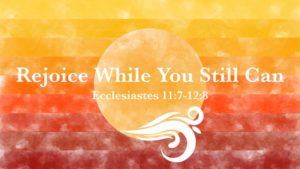 Life is short. Walk in the light while you have the light. Make the most of every day, receiving it as a gift from God. Enjoy God’s gifts, but recognize that your life is empty without God in the center of it. The gifts should never take place of the Giver in your affections. Even the happy days of your youth are meaningless without Him. In the end, He will hold you accountable for what you do with all that He has given you (11:9).
Life is short. Walk in the light while you have the light. Make the most of every day, receiving it as a gift from God. Enjoy God’s gifts, but recognize that your life is empty without God in the center of it. The gifts should never take place of the Giver in your affections. Even the happy days of your youth are meaningless without Him. In the end, He will hold you accountable for what you do with all that He has given you (11:9).
- REMEMBER YOUR CREATOR IN THE DAYS OF YOUR YOUTH.
The Reporter gives a graphic picture of old age, likening it to a house that is gradually deteriorating. It is foolish to put off remembering the Lord to a day you may never come to see. Now is the day of salvation (2 Corinthians 6:2).
Growing old is not for sissies. Notice the description of:
- Nerve problems– “the watchmen of the house tremble.”
- Skeletal shrinkage, bone and muscle aches and pains– “mighty men stoop”.
- Dental problems– “the grinding ones stand idle because they are few”.
- Visual impairment– “those who look through windows grow dim”.
- Confinement Can’t go outside- “the doors on the street are shut”.
- Hearing problems– as “the sound of the grinding mill is low”.
- Insomnia– “one will arise at the sound of the bird”.
- Requiring more rest and being easily disturbed– “all the daughters of song will sing softly”.
- Difficulty walking, loss of balance, fear of falling– “men are afraid of a high place and of terrors on the road”.
- Hair goes white- “the almond tree blossoms”.
- Energy level is low– the grasshopper drags himself along (no longer hopping).
- Loss of natural desires, appetite and sense of taste. “and the caperberry is ineffective” (It could have been an ancient aphrodisiac).
- Death is around the corner. “for man goes to his eternal home while mourners go about in the street.” (Ecclesiastes 12:5)
Death is described as the ultimate breaking down of the instrumental systems of life. Our physical body is no longer able to draw the life flow from the well from which it came. The silver cord is broken, the golden bowl is crushed, the pitcher by the well is shattered and the wheel at the cistern is crushed. The body returns to the dust from which it came, and the spirit returns to God who gave it. (12:7)
Remember God, because without a relationship with Him life is meaningless.
Remember your Creator in the days of your youth (Ecclesiastes 12:1), so you don’t waste your life in vain pursuits.
In these final verses, there is a prophetic picture of a greater than Solomon who gives greater imperatives. The Great Shepherd calls us to repent and believe the gospel. You can hang your faith on the sure nails of His promises. He saves us from our sins and from the futility of this life.
Jesus is the greater wise man. And if we are to be wise, we must hear His words and obey them.
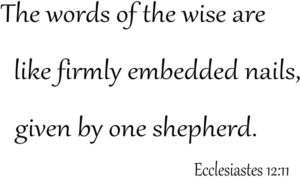 Ecclesiastes 12:11 11 The words of wise men are like goads, and masters of these collections are like well-driven nails; they are given by one Shepherd.
Ecclesiastes 12:11 11 The words of wise men are like goads, and masters of these collections are like well-driven nails; they are given by one Shepherd.
It is true that men are ever learning and never coming to the knowledge of the truth. Give attention to the true Book of Books, the Bible.
Ecclesiastes 12:12 12 But beyond this, my son, be warned: the writing of many books is endless, and excessive devotion to books is wearying to the body.
Here is the great conclusion of the Qoheleth:
Ecclesiastes 12:13-14 13 The conclusion, when all has been heard, is: fear God and keep His commandments, because this applies to every person. 14 For God will bring every act to judgment, everything which is hidden, whether it is good or evil.
TODAY’S READING FROM THE NEW TESTAMENT – 2 CORINTHIANS 8:1-15
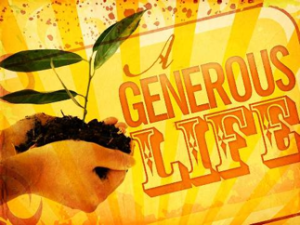 Paul gives two examples of joyful givers- the churches in Macedonia and the example of Jesus Christ.
Paul gives two examples of joyful givers- the churches in Macedonia and the example of Jesus Christ.
Giving is a grace. It is a ministry of the Holy Spirit. The churches in Macedonia were happily converted by the Holy Spirit into cheerful, full-time givers.
Paul had been organizing a collection for the church in Jerusalem. The church at Corinth had expressed a willingness to participate in this offering but were falling behind on their commitment. Now Paul challenges them to rise to the occasion. They have an opportunity to participate in the experience of God’s grace. The Holy Spirit is ready to convert all Christians into generous givers. The Macedonians begged Paul for permission to be able to help other churches!
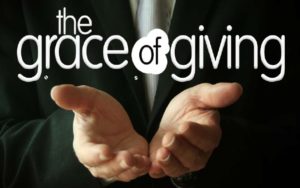 We have learned about the Macedonians. They were in deep poverty and experienced many afflictions, yet they loved others better than themselves and demonstrated this fact with the practical expression of selfless giving. They didn’t calculate what they could afford or had to spare. What was their secret? They gave themselves first to the Lord. The Lord wants us before our money. They joyfully surrendered themselves to God first, and then had the joy of His using them to bless others. They made themselves available to Paul and to the church at Jerusalem.
We have learned about the Macedonians. They were in deep poverty and experienced many afflictions, yet they loved others better than themselves and demonstrated this fact with the practical expression of selfless giving. They didn’t calculate what they could afford or had to spare. What was their secret? They gave themselves first to the Lord. The Lord wants us before our money. They joyfully surrendered themselves to God first, and then had the joy of His using them to bless others. They made themselves available to Paul and to the church at Jerusalem.
Paul then gives a second example of generosity. Christ Himself. “Though He was rich, yet for your sakes, He became poor.”
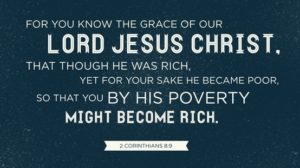 Prior to his three years of ministry, Jesus was employed as a carpenter. He was not poorer than the average first-century Jewish laborer. Yet Jesus was rich, in that He was and is the eternal Son of God. Paul describes the Incarnation as Jesus becoming poor. God voluntarily became fully human while remaining fully God. However, He willingly gives up His rights as God in becoming human. Though He was God, He willingly put Himself in a condition of being subject to human limitations. He, who was rich, became poor. He who shared the divine privilege of omnipresence limited Himself to dwell in one physical human body. He who lived in communion with the Father in glory now would be living in one place on a tiny planet He had made. He who shared in the glorious attributes of the Father and the Spirit limited His power and knowledge, relinquishing His eternal power and being to the Father’s disposal. He, who was rich, became poor. In setting aside so much, He has made us rich. He grants us the riches of salvation and eternal life. He shares with us His destiny and glorious inheritance.
Prior to his three years of ministry, Jesus was employed as a carpenter. He was not poorer than the average first-century Jewish laborer. Yet Jesus was rich, in that He was and is the eternal Son of God. Paul describes the Incarnation as Jesus becoming poor. God voluntarily became fully human while remaining fully God. However, He willingly gives up His rights as God in becoming human. Though He was God, He willingly put Himself in a condition of being subject to human limitations. He, who was rich, became poor. He who shared the divine privilege of omnipresence limited Himself to dwell in one physical human body. He who lived in communion with the Father in glory now would be living in one place on a tiny planet He had made. He who shared in the glorious attributes of the Father and the Spirit limited His power and knowledge, relinquishing His eternal power and being to the Father’s disposal. He, who was rich, became poor. In setting aside so much, He has made us rich. He grants us the riches of salvation and eternal life. He shares with us His destiny and glorious inheritance.
TODAY’S READING FROM THE BOOK OF PSALMS- PSALM 49:1-20
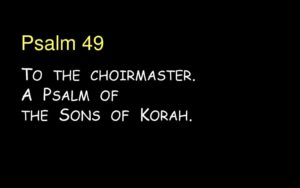 Psalm 49 To the choirmaster. A Psalm of the Sons of Korah.[/caption]
Psalm 49 To the choirmaster. A Psalm of the Sons of Korah.[/caption]
This is one of the 11 Psalms written by the sons of Korah (Psalm 42, 44-49, 84,85, 87and 88). Remember Moses’ nephew, Korah, led a rebellion against Moses. As a result, he died along with about 250 of his co-conspirators.
Numbers 16:31-33 31 As he finished speaking all these words, the ground that was under them split open; 32 and the earth opened its mouth and swallowed them up, and their households, and all the men who belonged to Korah with their possessions. 33 So they and all that belonged to them went down alive to Sheol; and the earth closed over them, and they perished from the midst of the assembly.
However, not all the sons of Korah were part of Korah’s household that was judged.
Numbers 26:11 11 The sons of Korah, however, did not die.
These descendants of Korah have given us some of our favorite psalms in the Bible.
In Psalm 49, we are given a riddle. Why is it that we don’t fear or bemoan our adversities or resent that others have material wealth that we do not have? It is because we have something far more assuring and valuable. We have the blessing of being redeemed. We have Christ. We have eternal life.
 Psalm 49:5-9 5 Why should I fear in days of adversity, When the iniquity of my foes surrounds me, 6 Even those who trust in their wealth and boast in the abundance of their riches? 7 No man can by any means redeem his brother Or give to God a ransom for him— 8 For the redemption of his soul is costly, And he should cease trying forever— 9 That he should live on eternally, That he should not undergo decay.
Psalm 49:5-9 5 Why should I fear in days of adversity, When the iniquity of my foes surrounds me, 6 Even those who trust in their wealth and boast in the abundance of their riches? 7 No man can by any means redeem his brother Or give to God a ransom for him— 8 For the redemption of his soul is costly, And he should cease trying forever— 9 That he should live on eternally, That he should not undergo decay.
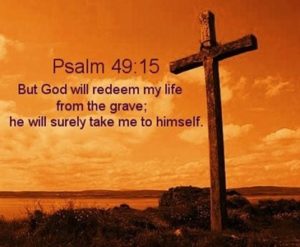 Psalm 49:15 15 But God will redeem my soul from the power of Sheol, For He will receive me. Selah.
Psalm 49:15 15 But God will redeem my soul from the power of Sheol, For He will receive me. Selah.
The Apostle Paul also answers this riddle in Ephesians 1:7.
Ephesians 1:7 7 In Him we have redemption through His blood, the forgiveness of our trespasses, according to the riches of His grace.
We need not ever envy the worldly success and wealth of others when we have the Light of Life.
Psalm 49:16-19 16 Do not be afraid when a man becomes rich, When the glory of his house is increased; 17 For when he dies he will carry nothing away; His glory will not descend after him. 18 Though while he lives he congratulates himself— And though men praise you when you do well for yourself— 19 He shall go to the generation of his fathers; They will never see the light.
TODAY’S READING FROM THE BOOK OF PROVERBS- PROVERBS 22:20-21
Proverbs 22:20-21 20 Have I not written to you excellent things of counsels and knowledge, 21 To make you know the certainty of the words of truth That you may correctly answer him who sent you?
These verses are part of an introduction of thirty sayings (‘excellent things’) most likely written by Solomon. He explains his motivation in sharing them. He wants them to know what is right and true so as to prove themselves to be dependable, competent and confident.
How about you? Do you recognize what is right and true? Are you a reliable witness and a faithful servant?
PRAY FOR THE NATIONS- Montenegro
Europe
Geography
A coastal Adriatic state. Small, but mountainous and picturesque.
Population: 625,516 Annual Growth: 0.03%
Capital: Podgorica
Urbanites: 59.5%
HDI Rank: 65 of 182 (UN Human Development Reports 2009)
Peoples
 Peoples: 24 (8% unreached) All peoples
Peoples: 24 (8% unreached) All peoples
Unreached Peoples Prayer Card
Official language: Ijekavian dialect of Serbian, one of the southern Slavonic languages Languages: 6 All languages
Religion
Largest Religion: Christian
|
Religion |
|
Pop % |
Ann Gr |
|
481,960 |
77.05 |
-0.3 |
|
|
286 |
0.0 |
5.2 |
Challenge for Prayer
Independence has brought optimism and hope. Montenegro is a small country but has great potential. If it can avoid the enmity between ethnic/religious communities that plagues most of the Balkans, there is much to look forward to. However, economic development (mostly through a burgeoning tourist industry and the aim of joining the EU) brings neither peace nor salvation, and less upright elements of society will now see the nation as a ripe new target for their vice. Pray for Montenegro to be a just, peaceful and corruption-free nation which enjoys ethnic harmony. Pray that people will seek the truth in the midst of their new-found nationhood.
PRAYER: Gracious God, thank You for the miraculous rescue provided on our behalf through the self-sacrificial love shown to us in Christ. He who was rich, for our sakes, became poor, that through His poverty we might become rich. He took our cross that we might wear His crown. He took our sin that we might be made righteous in Him. He took our curse that we might receive His blessing. Holy Spirit, may we be mindful of Your love and participate in the grace of joyful giving, knowing we can never out-give You. In Jesus’ Name. Amen.


